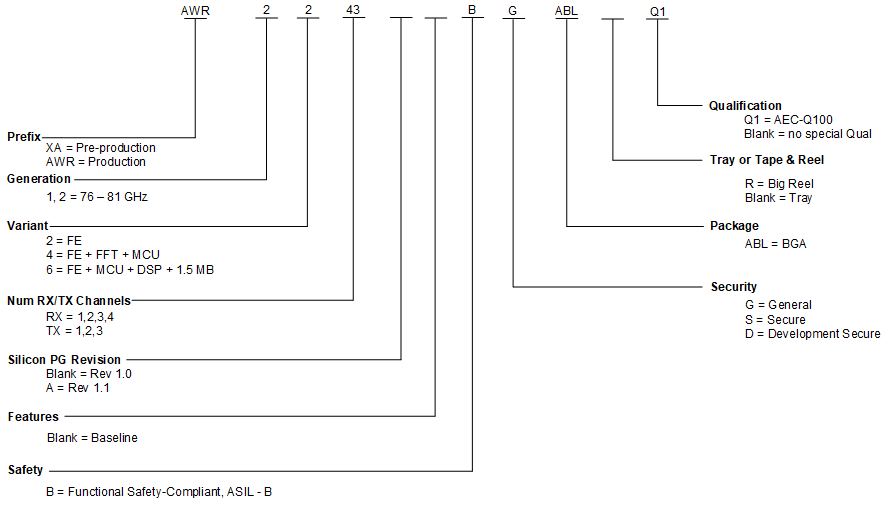JAJSIK5D February 2020 – February 2024 AWR2243
PRODUCTION DATA
- 1
- 1 特長
- 2 アプリケーション
- 3 概要
- 4 機能ブロック図
- 5 Device Comparison
- 6 Terminal Configuration and Functions
-
7 Specifications
- 7.1 Absolute Maximum Ratings
- 7.2 ESD Ratings
- 7.3 Power-On Hours (POH)
- 7.4 Recommended Operating Conditions
- 7.5 Power Supply Specifications
- 7.6 Power Consumption Summary
- 7.7 RF Specification
- 7.8 Thermal Resistance Characteristics for FCBGA Package [ABL0161]
- 7.9
Timing and Switching Characteristics
- 7.9.1 Power Supply Sequencing and Reset Timing
- 7.9.2 Synchronized Frame Triggering
- 7.9.3 Input Clocks and Oscillators
- 7.9.4 Multibuffered / Standard Serial Peripheral Interface (MibSPI)
- 7.9.5 Inter-Integrated Circuit Interface (I2C)
- 7.9.6 LVDS Interface Configuration
- 7.9.7 General-Purpose Input/Output
- 7.9.8 Camera Serial Interface (CSI)
- 8 Detailed Description
- 9 Monitoring and Diagnostic Mechanisms
- 10Applications, Implementation, and Layout
- 11Device and Documentation Support
- 12Revision History
- 13Mechanical, Packaging, and Orderable Information
11.1 Device Nomenclature
To designate the stages in the product development cycle, TI assigns prefixes to the part numbers of all microprocessors (MPUs) and support tools. Each device has one of three prefixes: X, P, or null (no prefix) (for example, AWR2243). Texas Instruments recommends two of three possible prefix designators for its support tools: TMDX and TMDS. These prefixes represent evolutionary stages of product development from engineering prototypes (TMDX) through fully qualified production devices and tools (TMDS).
Device development evolutionary flow:
- XExperimental device that is not necessarily representative of the final device's electrical specifications and may not use production assembly flow.
- PPrototype device that is not necessarily the final silicon die and may not necessarily meet final electrical specifications.
- nullProduction version of the silicon die that is fully qualified.
Support tool development evolutionary flow:
- TMDXDevelopment-support product that has not yet completed Texas Instruments internal qualification testing.
- TMDSFully-qualified development-support product.
X and P devices and TMDX development-support tools are shipped against the following disclaimer:
"Developmental product is intended for internal evaluation purposes."
Production devices and TMDS development-support tools have been characterized fully, and the quality and reliability of the device have been demonstrated fully. TI's standard warranty applies.
Predictions show that prototype devices (X or P) have a greater failure rate than the standard production devices. Texas Instruments recommends that these devices not be used in any production system because their expected end-use failure rate still is undefined. Only qualified production devices are to be used.
TI device nomenclature also includes a suffix with the device family name. This suffix indicates the package type (for example, ABL0161), the temperature range (for example, blank is the default commercial temperature range). Figure 11-1 provides a legend for reading the complete device name for any AWR2243 device.
For orderable part numbers of AWR2243 devices in the ABL0161 package types, see the Package Option Addendum of this document, the TI website (www.ti.com), or contact your TI sales representative.
For additional description of the device nomenclature markings on the die, see the AWR2243 Device Errata.
 Figure 11-1 Device Nomenclature
Figure 11-1 Device Nomenclature